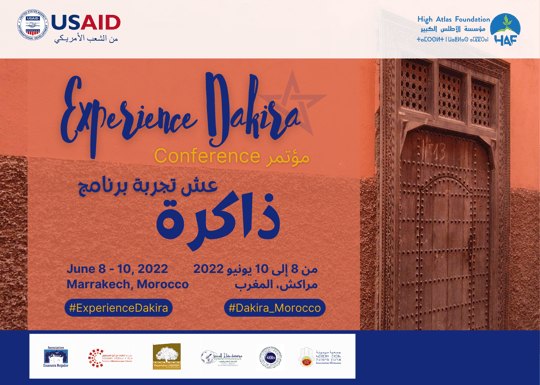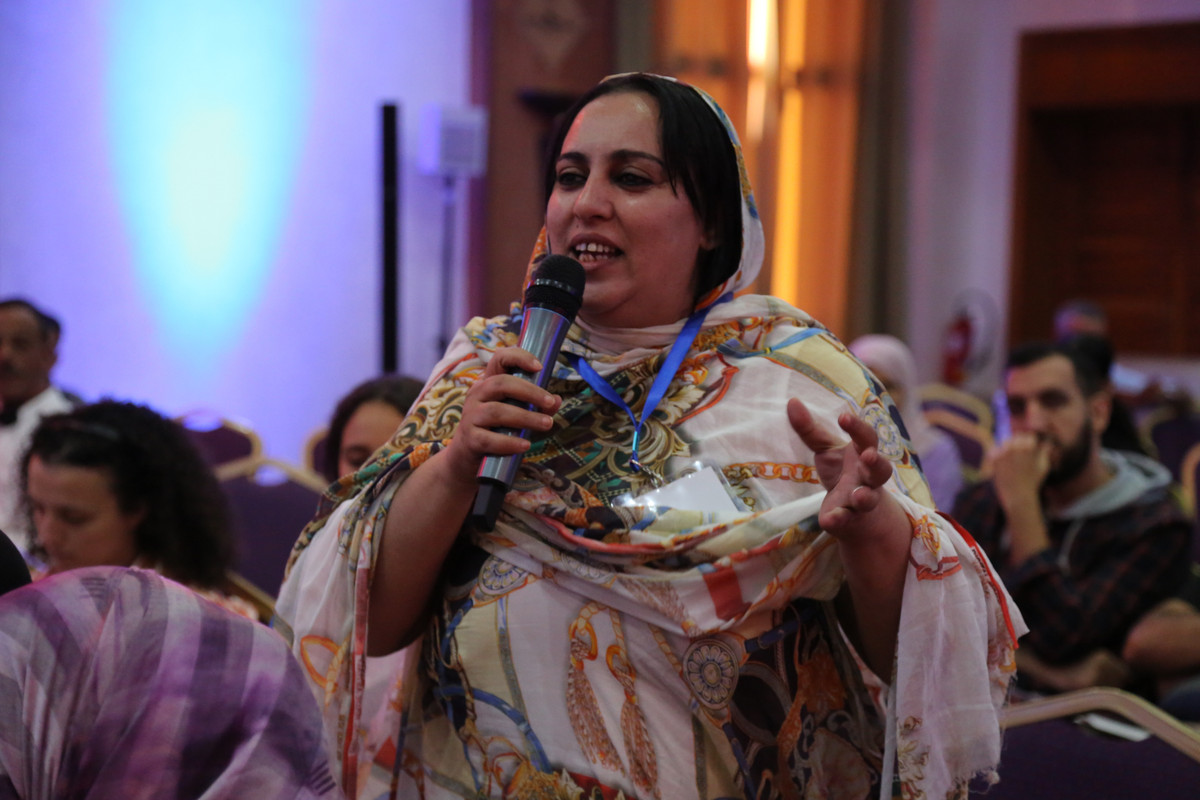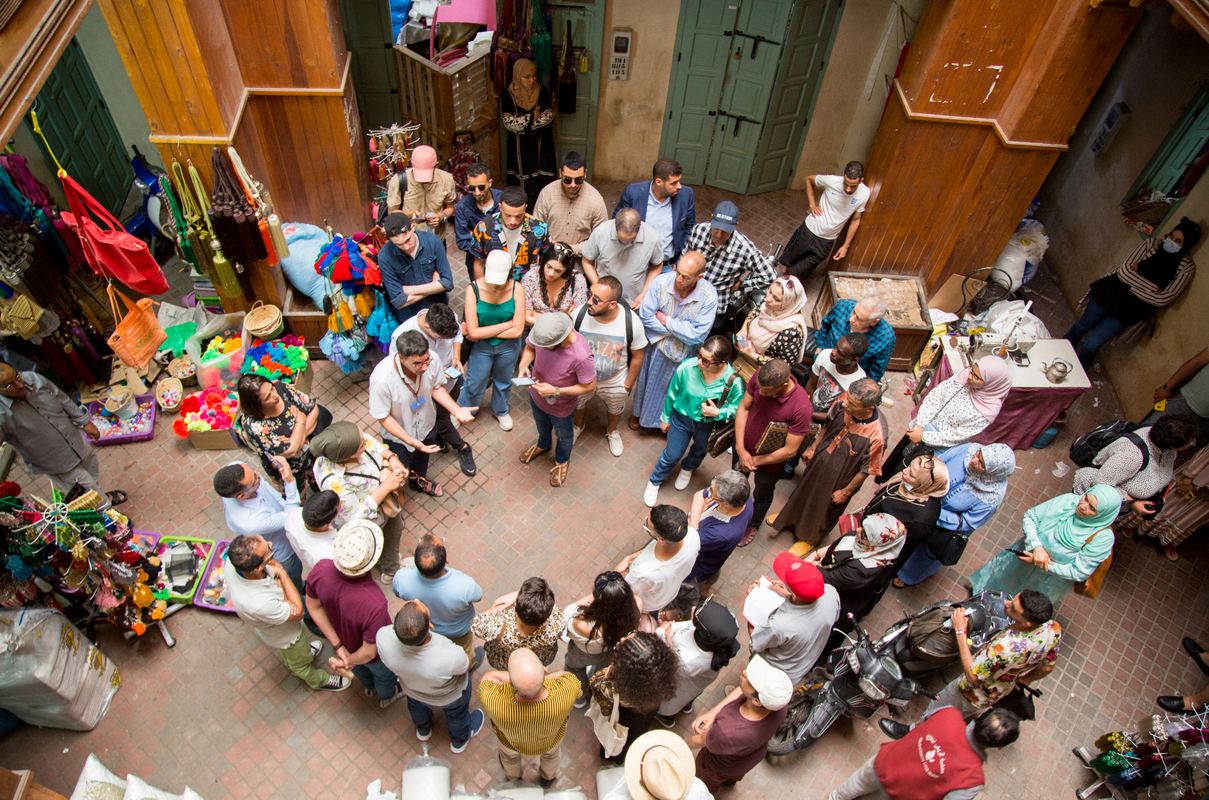“Experience Dakira” Conference gathers civil society and community stakeholders from around Morocco for the preservation and transmission of the Kingdom’s diverse cultural heritage


PRESS RELEASE
“Experience Dakira” Conference gathers civil society and community stakeholders from around Morocco for the preservation and transmission of the Kingdom’s diverse cultural heritage
Marrakech (June 10, 2022) – The USAID Dakira program, implemented by the High Atlas Foundation, successfully hosted its first conference, called “Experience Dakira,” at the Palm Plaza Hotel in Marrakech on June 8-10, 2022. Over 160 attendees from across Morocco as well as other parts of the world participated in the event, which highlighted the program’s goals and approaches to the preservation and sharing of Morocco’s multicultural heritage and memory, provided learning and networking opportunities for civil society and community members toward this goal, and paved a pathway for the continuation and expansion of the program on the cusp of entering its second year.
The conference prompted attendees to consider their own meanings of “Moroccanness.” It showcased everyday storytellers of Morocco’s pluralistic past, exhibited artistic pathways to community dialogue, highlighted commonalities between religious and ethnic groups, and encouraged reflection on the role of youth and women in heritage sustainability. Testimonials and conversations with Dakira partners and participants prompted exploration of traditional and novel methods of preserving Morocco’s multicultural identity through collective community efforts.
“The USAID Dakira program reinforces the efforts of the Moroccan government, under the leadership of His Majesty King Mohammed VI, to promote tolerance and interreligious dialogue,” said Juan Carlos Rodriguez, USAID/Morocco General Development Office Director during the Opening Ceremony. “Religious tolerance, multiculturalism, and interfaith dialogue are essential elements of the American-Moroccan partnership, a partnership built and maintained for two hundred years.”
The event encompassed a variety of activities, including a trip to the 700 year-old Akrich Jewish Cemetery and its adjacent fruit tree nursery to engage in interfaith dialogue toward collective project planning, discussions featuring stakeholders in cultural heritage representing academia, civil society, and the arts, including renowned Moroccan filmmaker, Izza Genini, and a tour of the Marrakech Mellah.
Over the course of the conference, attendees engaged in a participatory, creative, and strategic brainstorming and planning process in small groups. The main priority they expressed focused on the integration of youth in heritage preservation efforts, from providing tailored education for children to building the capacities of young people to train and work in the culture sector. Other top priorities included elevating women as intergenerational gatekeepers of culture and folklore, expressly through oral storytelling and documentation, as well as establishing a radio network dedicated to the dissemination of Moroccan cultural heritage and exchange of ideas and stories across Morocco’s diverse regions and peoples.
The conference also provided the space for Dakira program partners to meet, share examples of good practices, and extend their networks to implement cultural heritage preservation projects on a wider scale, both locally and regionally.
According to Jessica Stephens, member of the Sefrou Association for Multidisciplinary Arts (SAMA), a Dakira program partner organization, the gathering promoted “community-building and peacework.” She added, “to bring Sefrou to Marrakech has been a golden opportunity, but what I think is really magical is bringing all these people together on the topic of multiculturalism.”
“Thank you for a wonderful and immersive conference,” shared Yassine Chtaou, an attendee who studies law at Cadi Ayyad University. “I appreciated the organizers’ caring disposition and teaching style. Thank you for incorporating humor and even performances. I will remember those forever. Toward more preservation of our Moroccan heritage!”
—
The USAID Dakira Program, implemented by the High Atlas Foundation and its partners, Mimouna Association, Fondation Mémoires pour l’Avenir, Essaouira Mogador Association, Association Argania, Sefrou Association for Multidisciplinary Arts, and Fondation Miftah Essaad, aims to collaboratively develop and pioneer a unique participatory approach to the educational preservation of Morocco’s multicultural history. The program encourages local communities to capture, preserve, and transmit their collective memories so that they are better equipped to take ownership of the revitalization of their own histories. This introspective, experience-sharing approach among local participants maximizes relationship building, leading to collective actions that improve livelihoods and a deepened discovery of Morocco’s multicultural identity.
Contacts:
Soukaina Kherdioui, High Atlas Foundation
soukaina@highatlasfoundation.org, 06 41 61 99 22
Margaret Sullivan, USAID
masullivan@usaid.gov, 06 00 36 65 56

Experience Dakira Conference Participant Hana Ezaoui shares thoughts on Moroccanness and memory, June 9, 2022.

Dr. Yossef Ben-Meir, HAF President and Chief of Party of the USAID Dakira program delivers a welcoming speech during the Opening Ceremony on June 8.

Conference participants engage in participatory brainstorming and discussion surrounding the preservation of Morocco’s multicultural heritage, June 9, 2022.

Conference attendees participate in a tour of the Marrakech Mellah on June 8, 2022.
